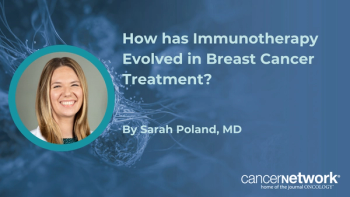
Trial links gene to recurrence risk in triple-negative breast cancer
Patients with operable triple-negative breast cancer are at increased risk for recurrence if their tumor has higher levels of a protein-encoding gene implicated in migration, proliferation, and other cellular processes, reported Joseph A. Sparano, MD, from the Eastern Cooperative Oncology Group.
SAN ANTONIO-Patients with operable triple-negative breast cancer are at increased risk for recurrence if their tumor has higher levels of a protein-encoding gene implicated in migration, proliferation, and other cellular processes, reported Joseph A. Sparano, MD, from the Eastern Cooperative Oncology Group.
Triple-negative breast cancer is associated with elevated risks of axillary metastases and early recurrence, said Dr. Sparano, who is also director of the Breast Evaluation Center at the Montefiore-Einstein Cancer Center in New York.
"There are no reliable prognostic markers for this subtype," he said.
The study used data and tissue from the E2197 trial, which assigned patients with stage I to stage III breast cancer to adjuvant treatment with AC (doxorubicin and cyclophosphamide) or AT (doxorubicin and docetaxel), followed by radiation therapy, if indicated, and by hormonal therapy for those with hormone receptors. Median follow-up was 76 months.
Using a case-control design, Dr. Sparano and his colleagues selected all patients in the trial who had a recurrence. Three to four matched controls without recurrence were also selected. A central laboratory performed immunohistochemistry for estrogen receptors, progesterone receptors, and HER2, as well as quantitative RT-PCR to assess the RNA expression of 371 genes implicated in prognosis or the response to chemotherapy (SABCS abstract 25).
The analyses reported were restricted to the 246 patients who had triple-negative disease, defined as having Allred scores of 0 to 2 for hormone receptors and as having a negative or equivocal result for HER2 using the HercepTest. Some 24% of this group experienced a recurrence.
After adjustment to minimize the false-discovery rate, six genes had expression associated with recurrence risk, Dr. Sparano reported. Specifically, a higher level of expression of the gene for growth factor receptor-bound protein 7 (GRB7) was positively associated with the risk of recurrence (coefficient, 0.637).
In contrast, higher levels of expression of the five other genes-apolipoprotein C1 (APOC1), estrogen receptor beta (ESR2), PIM2 oncogene (PIM2), the macrophage antigen (CD68), and baculoviral IAP repeat-containing 3 (BIRC3)-were associated with a reduced risk of recurrence (coefficients, –0.399 to –2.48).
In addition, several genes showed expression correlating with GRB7 expression (r >0.40), according to Dr. Sparano.
"These included ERBB2 and ERBB3, known to be involved in signaling; keratin 19 (KRT19), which is known to be associated with the basal genotype; and other genes involved in adhesion and signaling," he said.
Compared with patients having a high (above-median) level of GRB7 expression, those having a low (below-median) level did not differ in terms of number of positive axillary nodes, tumor grade, and tumor size. High expressers were significantly less likely to be older than 65 (3% versus 10%), but few patients fell into this age group, Sparano cautioned.
In a multivariate model that also included age, number of involved nodes, and tumor grade and size, each two-unit increase in GRB7 expression level was associated with a significant more than tripling of the risk of recurrence (hazard ratio, 3.41). When GRB7 expression was instead analyzed as a dichotomous variable, high expression was associated with a significant more than doubling of risk compared with low expression (hazard ratio, 2.31).
In absolute terms, the five-year recurrence rate in patients with a high level of GRB7 expression was 20.4%, nearly twice the rate of 10.5% among patients with a low level of expression.
"GRB7 or GRB7-dependent pathways may be potential therapeutic targets in triple-negative breast cancer and may serve as prognostic factors that are independent of classical clinicopathologic features," Dr. Sparano concluded.
The GRB7 protein binds to phosphorylated receptor tyrosine kinases and other protein targets, he said, so plays a role in signaling, proliferation, migration, and cell-matrix and cell-cell interactions.
In terms of diagnostic applications, GRB7 is included in several molecular signatures, including the 21-gene Oncotype DX signature and the 512-gene intrinsic gene set, in addition to the signature defined in the study, according to Dr. Sparano. For therapeutic applications, a peptide inhibitor of GRB7 has been found to block migration and proliferation, and enhance the effects of doxorubicin and trastuzumab in breast cancer cell lines.
Newsletter
Stay up to date on recent advances in the multidisciplinary approach to cancer.














































